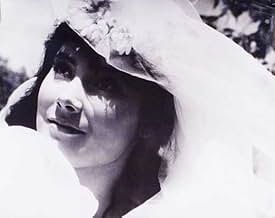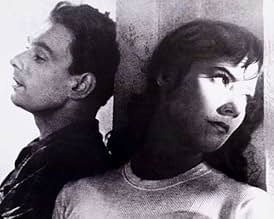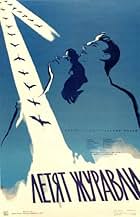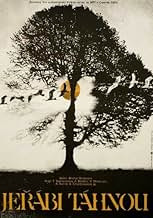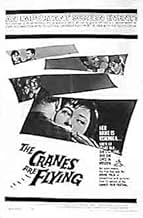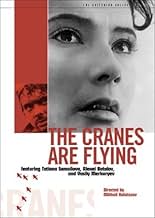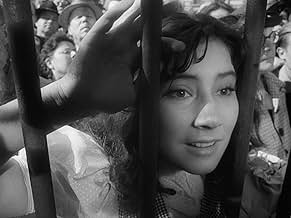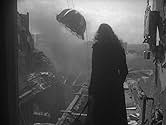Veronica plant ein Rendezvous mit ihrem Liebhaber Boris am Flussufer. Kurz darauf wird er zum Zweiten Weltkrieg einberufen.Veronica plant ein Rendezvous mit ihrem Liebhaber Boris am Flussufer. Kurz darauf wird er zum Zweiten Weltkrieg einberufen.Veronica plant ein Rendezvous mit ihrem Liebhaber Boris am Flussufer. Kurz darauf wird er zum Zweiten Weltkrieg einberufen.
- Nominiert für 2 BAFTA Awards
- 4 Gewinne & 3 Nominierungen insgesamt
- Veronika
- (as T. Samoylova)
- Boris Fyodorovich Borozdin
- (as A. Batalov)
- Fyodor Ivanovich Borozdin
- (as V. Merkuryev)
- Mark Aleksandrovich Borozdin
- (as A. Shvorin)
- Irina Fyodorovna Borozdina
- (as S. Kharitonova)
- Volodya
- (as K. Nikitin)
- Stepan
- (as V. Zubkov)
- Varvara Kapitanova -babushka Borisa i Irina
- (as A. Bogdanova)
- Nikolay Chernov
- (as B. Kokovkin)
- Anna Mikhaylovna Lebedeva
- (as Ye. Kupriyanova)
- Lyuba
- (as V. Ananina)
- Soldatka
- (as V. Vladimirova)
- Dasha
- (as O. Dzisko)
- Sachkov
- (as L. Knyazev)
- Anatoliy Kuzmin
- (as Yu. Kulikov)
- Ranenyy
- (as D. Netrebin)
- Borya
- (as Sasha Popov)
- Antonina Monastyrskaya
- (as I. Preys)
Empfohlene Bewertungen
Acting, cinematography, writing: all perfect 10s here. You'll certainly appreciate it if you're Russian like me, but even if not, you'll probably love it. If you speak no Russian, look for the RUSCICO (Russian Cinema Council) DVD version. It's got subtitles in about 14 different languages, but the English dubbing on this one I'd say is just as good. It's of course not as good as the original Russian track (some stuff is lost in translation), but just as good as the English subtitles. So go check it out, especially if you're studying film in any aspect.
I must mention, also, that the cinematography is so crisp, it seems to be 4 decades ahead of its time. As far as composition and movement of the camera, I'd say it has strains of several styles, including German Expressionism of the 20's and 30's, and the stormy noir melodramas of the '40s, like "Out of the Past" (1947).
This is a romantic, dramatic movie that looks long and hard at the repercussions of war, and yes, it does have a message and it certainly hammers it home, but still I think it stays more clearly in the realm of universal themes, rather than falling into the propagandist ditch.
In summary, I don't think I have ever seen better acting, better camera work, better editing, or better direction in any movie made previous to it. There were some scenes made with such planning and precision that I had to press "PAUSE" just to catch my breath. Lovers of movie history, enjoy!
Nonetheless, we haven't seen it filmed this well, with bold shots that take liberties to emphasize separation, or destruction, or hopelessness. All the more remarkable coming from the Soviet Union, and reason to conclude that Tarkovsky is not the last word in modern-era Soviet cinema.
I was reading Chekhov's "Three Sisters" the other day, and chanced upon what may be the meaning of the title of this film. In Act 2, Masha objects to the notion that we must live our lives without meaning or understanding:
"MASHA: Surely mankind must believe in something, or at least seek for the truth, otherwise life is just emptiness, emptiness. To live and not to know why the cranes are flying, why children are born, why there are stars in the sky. Either you must know why it is you live, or everything is trivial - mere pointless nonsense."
Likewise, Veronika has a hard time believing that the war, and her and others' sufferings, have been pointless. Better to assign a meaning, to live as if one's life is significant, and not to give in to despair. It is perhaps this thinking that prompts her to her final act in the film.
BTW as a minor correction to one other comment here--there may be a pattern of V's in the film, though I hadn't noticed them myself. But the first letter of Veronika's name is not a further instance of this; in the Cyrillic alphabet, her name begins with a letter which looks like an English "B".
Wusstest du schon
- WissenswertesOne of the most notable features of the film is cinematographer Sergey Urusevskiy's then ground-breaking use of hand-held cameras. He had learned how to film like this when he was a military cameraman during the war.
- Zitate
Stepan: Dear mother, father, sisters and brothers! The happiness of our reunion is immeasurable. The heart of every Soviet citizen is filled with joy. Joy sings in our hearts. It is victory that has brought us this joy. We have all waited for this moment. But we shall not forget those left behind on the battlefield. Time will pass. Towns and villages will be rebuilt. Our wounds will heal. But our fierce hatred of war will never diminish. We share the grief of those who cannot meet their loved ones today, and we will do everything to insure that sweethearts are never again parted by war, that mothers need never again fear for their children's lives, that fathers need never again choke back hidden tears. We have won, and we shall live not to destroy, but to build a new life!
- VerbindungenEdited into Nitrato d'argento (1996)
Top-Auswahl
- How long is The Cranes Are Flying?Powered by Alexa
Details
- Erscheinungsdatum
- Herkunftsland
- Offizieller Standort
- Sprache
- Auch bekannt als
- The Cranes Are Flying
- Drehorte
- Produktionsfirma
- Weitere beteiligte Unternehmen bei IMDbPro anzeigen
Box Office
- Bruttoertrag in den USA und Kanada
- 17.923 $
- Weltweiter Bruttoertrag
- 32.549 $
- Laufzeit
- 1 Std. 35 Min.(95 min)
- Farbe
- Sound-Mix
- Seitenverhältnis
- 1.37 : 1

